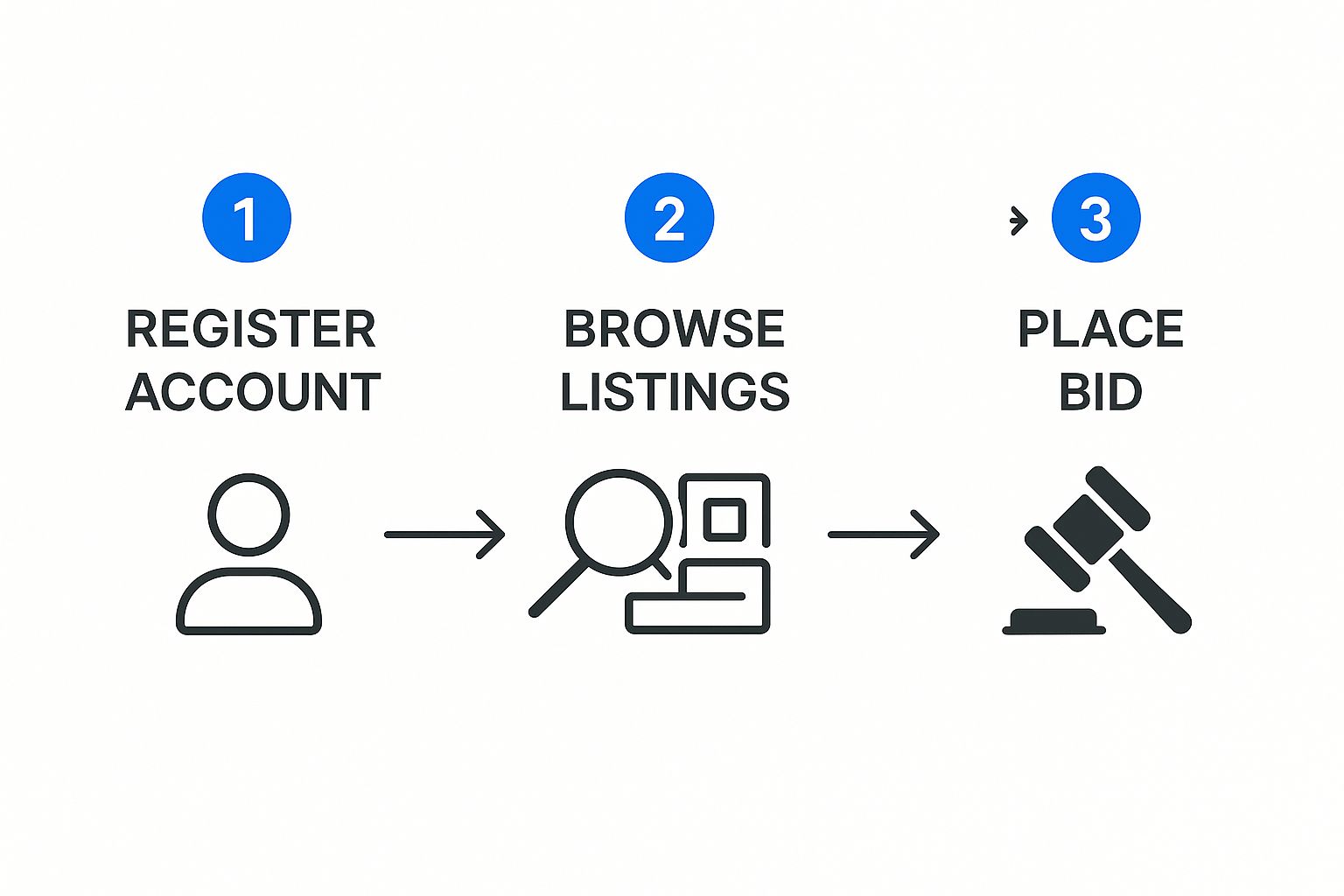Your Guide to Online Estate Auctions

Ever wondered what happens to all the items in a home when someone moves or passes away? Increasingly, they're sold in online estate auctions—think of them as digital treasure hunts where an entire home's contents are opened up for bidding, right from your screen.
These events take the unique, story-filled items of a traditional estate sale and blend them with the incredible convenience and reach of the internet.
What Are Online Estate Auctions, Really?

At its heart, an online estate auction is the digital counterpart to a classic, in-person auction. But instead of gathering in a crowded room with a fast-talking auctioneer, you get to place bids from your computer or phone over a few days.
These aren't just about scoring a bargain. They're about discovering items with a past—from antique furniture and vintage jewelry to rare collectibles and even quality everyday goods. It’s a completely different experience from scrolling through a massive marketplace like eBay.
Here’s the key difference: an online estate auction liquidates the contents of a single home or collection. This creates a curated, themed event where every item shares a common origin, offering a fascinating glimpse into a person's life and style. The whole process is managed by a dedicated auction platform that handles everything from cataloging and photography to managing bids and payments.
Why Auctions Are Moving Online
This digital shift has blown the doors wide open, making these sales accessible to everyone and fueling some serious growth. This isn't just a niche hobby anymore; it's becoming a major market.
The global online auction space is expected to grow by a staggering USD 3.98 billion between 2025 and 2029. That’s a huge indicator of how much our habits for buying and selling secondhand goods are changing. A recent industry report on PR Newswire digs into the forces driving this expansion.
The core idea is simple: it’s a timed, competitive sale for everything from one estate, all managed online. You get the story and scope of a traditional estate sale paired with the exciting, competitive energy of an auction.
This setup is a win-win. Sellers reach a massive audience of interested buyers, not just locals. And buyers get access to incredible inventories they’d never find in their own neighborhood. It's a transparent and refreshingly efficient way to connect fascinating items with new owners who will cherish them.
Why You Should Try Online Auctions

The boom in online estate auctions isn't just some fleeting trend. It marks a real change in how people discover, purchase, and sell quality secondhand goods. If you’re a bidder or a collector, the perks are obvious right away.
The days of having to drive to a physical sale, often on short notice, are over. Now you can join an auction happening hundreds of miles away, all from your own couch. This opens up a massive world of inventory that used to be totally out of reach. A collector in Florida can now easily bid on a rare find from an estate in Oregon, and a city dweller can furnish their entire apartment with unique pieces from a country home.
The convenience is huge, but it’s the thrill of discovery that really keeps people coming back. You just never know what you'll find, and you can often get incredible items for fantastic prices.
Benefits for Buyers and Sellers
If you're the one managing an estate, the advantages are just as compelling. Instead of being limited to whoever shows up on a Saturday morning, online estate auctions can attract a nationwide—or even global—pool of eager buyers.
This wider audience naturally sparks more competition, which often drives up the final sale prices for desirable items. For anyone serving as an executor, this means a more efficient and profitable process that honors their duty to the estate.
- For Buyers: You get access to a much bigger selection of items, from antique furniture to niche collectibles, with no geographic barriers.
- For Sellers: You can tap into a national market, making sure your items get seen by the most serious and interested bidders, which maximizes your potential earnings.
The real magic is the removal of boundaries. An online auction connects the right item with the right buyer, no matter where they are. This creates a more dynamic and fair marketplace for everyone.
At the end of the day, whether you're hunting for a one-of-a-kind piece or trying to figure out the best way to handle a loved one's belongings, online auctions are a powerful solution. They perfectly blend the old-school charm of estate sales with the reach of modern technology.
How to Bid and Win Like a Pro
Jumping into your first online estate auction can feel a little intimidating, like walking into a high-stakes game without knowing all the rules. But don't worry—the process is actually pretty simple once you get the hang of it. With a few key strategies under your belt, you'll be bidding confidently and winning the items you really want.
This little flowchart breaks down the three main steps to get you started.

It really is that simple: create your account, find items you love, and place your bid. Mastering these three actions is the foundation for having a great time at an online auction.
Mastering the Bidding Mechanics
Once you're registered and have started browsing, you'll come across a couple of key bidding concepts. Understanding these is what separates the casual browser from a seasoned pro. Think of them as the special moves that will help you win.
First up is the max bid, sometimes called a proxy bid. Instead of clicking to outbid someone every single time, you can just tell the system the absolute highest amount you're willing to pay. From there, it automatically places bids for you, but only just enough to keep you in the lead, all the way up to your limit. This is a game-changer for avoiding emotional, last-minute decisions.
The max bid is your secret weapon. It lets you set your budget and step away, stopping you from getting swept up in a bidding war and paying more than you planned. You stick to your price, and the platform does the heavy lifting.
Another term you need to know is the soft close. This feature is designed to stop "sniping"—when someone swoops in and places a winning bid in the literal last second. If a bid comes in during the final few minutes, the auction clock for that item extends. It ensures everyone gets a fair shot to respond, just like at a live auction where the auctioneer calls "Going once, going twice..."
If you're new to this world, it also helps to know how these sales differ. For a complete breakdown, check out our guide on the estate sale vs an auction.
After You Win an Item
Congratulations, you won! Now what? The process after the auction is just as important. You’ll get an invoice in your email that breaks everything down, including:
- The Hammer Price: This is your final, winning bid amount.
- The Buyer's Premium: A percentage-based fee that's added to the hammer price.
- Sales Tax: This is applied based on your local rules and regulations.
Once your invoice is paid, you'll arrange for pickup or shipping. Make sure you read the auction’s terms carefully, as some sales are for local pickup only.
How to Spot Real Value and Avoid Buyer's Remorse

Let’s be honest, the real thrill of an online estate auction is finding a true treasure. But the difference between a great find and a dud often comes down to a little detective work. Avoiding buyer's remorse isn't just about winning an item; it's about winning the right item at the right price.
Your best strategy is to put on your investigator hat before you even think about placing a bid. Scrutinize every single photo. Zoom in. Look for the little things—chips, cracks, stains, or signs of a repair that aren't mentioned in the description. A vague description paired with blurry photos? That's a huge red flag.
Decode the True Cost of Your Win
Here’s a rookie mistake we see all the time: forgetting that your winning bid isn't the final price. Two major factors can jack up your total cost, and you need to account for them.
- The Buyer's Premium: This is a fee the auction house adds to your winning bid, usually 15-25%. That cool lamp you won for $200? With a 20% premium, it’s suddenly a $240 purchase, and that’s before shipping.
- Shipping and Handling: This is the big one, especially for bulky furniture or fragile artwork. Sometimes, shipping can cost more than the item itself. Always, always get a shipping estimate before you bid on a large piece.
This level of diligence is critical, especially as the market for high-value items explodes. The art and antiques auction market, a massive slice of online estate auctions, is on track to blow past USD 20 billion in 2024.
Think of every listing as an incomplete story. The photos and description are just the first chapter. It's your job to fill in the missing details through research and asking questions to ensure a happy ending.
By factoring in these extra costs and doing your homework on each item, you can bid with total confidence. For more pro tips, check out our guide on tips for finding gems at online auctions. This disciplined approach turns bidding from a gamble into a smart strategy, making every win feel like a true victory.
Finding the Best Online Auction Websites
Let's be clear: not all online auction platforms are the same. The website you choose will single-handedly define your entire experience, from the kinds of treasures you discover to the final price you pay. It’s the most important decision you'll make.
Think of it like this—you have two basic paths. You can go with large, national aggregators that cast a massive net, pulling in auctions from all over the country. Or, you can find a specialized local auction house that offers a more curated, regional flavor. Your choice really boils down to whether you're hunting for sheer variety or local gems.
Key Factors for Evaluating Platforms
Before you even think about creating an account, you need to do a little homework on the platform itself. A few minutes of research upfront can save you from a world of headaches later. Your goal is to find a trusted partner where you can bid with total confidence.
Here are the non-negotiables to look for:
- Reputation and Reviews: What are actual buyers saying about them? Look for consistent feedback about fair bidding, accurate item descriptions, and decent customer service.
- Fee Transparency: Are the buyer’s premium, shipping estimates, and other potential charges spelled out clearly? Hidden fees are a huge red flag.
- Shipping and Pickup Policies: How do they manage shipping for bulky or delicate items? Are their pickup times and locations actually feasible for you?
This growing global interest in online estate auctions makes choosing a solid platform more important than ever. While North America leads the market today, the Asia Pacific region is projected to grow by roughly 10.2% as more people get in on the action.
A great auction website operates with complete transparency. You should never be left guessing about the rules, the fees, or the true condition of an item. If that information is buried or confusing, it's time to find another platform.
Of course, picking the right website is just one side of the coin. If you're the one managing an estate, you'll need to understand how things work from the seller's perspective, too. You can get a complete picture of the process by checking out our guide on how to run your first online estate auction.
Your Online Auction Questions Answered
Jumping into the world of online auctions is exciting, but it’s completely normal to have a few questions about how it all works behind the scenes. Think of this as your practical FAQ, tackling the most common uncertainties we hear about.
Let’s clear things up so you can bid with total confidence.
How Does Shipping Work for Large Items Like Furniture?
This is probably the most important question to ask before you bid. For big, bulky items like a dining room table or a sofa, shipping is almost always the buyer's responsibility. The auction house isn't a logistics company, after all.
They will usually give you a list of trusted third-party freight companies, but it's up to you to get a quote, book the service, and pay for it. Seriously, get that shipping quote before you bid. It's not unheard of for freight costs to be higher than the winning bid itself. And always double-check the auction details—many listings are for local pickup only, meaning you'll have to go get it yourself.
What Is a Buyer's Premium and How Does It Work?
A buyer’s premium is a standard fee in the auction world. It’s a percentage added on top of your winning bid (the "hammer price") that goes directly to the auction house to cover the costs of running the sale.
For example, if you win a painting for $100 and the buyer's premium is 15%, your final cost for that item becomes $115, before any taxes or shipping. This fee varies from one auction to the next, so always check the terms before you get your heart set on something.
Are All Sales Final in Online Auctions?
In a word: yes. Just about every online auction item is sold "as-is, where-is." This is industry speak for "what you see is what you get." There are no returns, refunds, or exchanges, even if you notice a scratch you didn't see in the photos.
This is why doing your homework is absolutely critical. Read the description from top to bottom, zoom in on every single photo, and if you still have questions about an item's condition, ask the auction company before placing a bid.
What Is a Soft Close and Why Does It Matter?
A "soft close" is a brilliant feature that keeps things fair and prevents last-second "sniping." You know, when someone swoops in at the last possible second to steal the win.
If a bid is placed in the final few minutes of an auction, the clock for that specific item automatically extends, usually by another two or three minutes. This process repeats until all bidding stops, mimicking the "going once, going twice" drama of a live auction and giving everyone a fair shot. Understanding how the soft close works is key to timing your final bids and not getting outplayed.